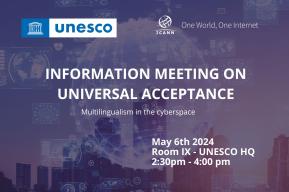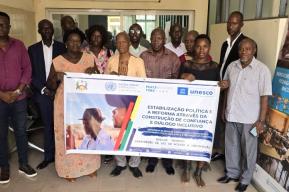News
Cambodia commemorates International Day for Universal Access to Information 2019

UNESCO, in collaboration with the Ministry of Information, civil-society and media stakeholders, commemorated the International Day for Universal Access to Information (IDUAI) on 8 October 2019 in Phnom Penh, Cambodia. Over 130 participants, including senior officials from the Royal Government of Cambodia, representatives from the diplomatic core, UN Agencies, development partners, academia, civil-society, media stakeholders and journalists, and youth, attended the event.
The global theme for the commemoration this year is “Access to Information: Leaving no one behind!”, which stresses the need for information to achieve sustainable development for all and enable informed citizens to advocate for their rights. UNESCO annually marks 28 September as the IDUAI, following the adoption of the resolution (38 C/70) by member states.
H.E. Khieu Kanharith, Minister of Information, addressed the gathering and emphasized the significance of commemorating IDUAI in Cambodia, as the Ministry of Information, in inclusive and fully participatory consultation with civil-society and media stakeholders, is in the process of drafting the Access to Information (A2I) law. He noted that with the inter-ministerial meeting taking place in November to review the draft law, it signals the reform of the administrative system and good governance in providing efficient, transparent and accountable services to the public in line with the fourth phase Rectangular Strategy of the Royal Government of Cambodia.
Sardar Umar Alam, UNESCO Country Representative, gave an opening speech, highlighting that UNESCO, in partnership with Member States globally, celebrates this day to acknowledge the Right to Information as a fundamental human right. He noted that over the past two decades, the right to information has been recognized by an increasing number of countries, including developing ones, through the adoption of a wave of access to information laws – over 120 countries have adopted legal frameworks for it so far.
Recognizing the inclusive process adopted by the Ministry of Information in drafting the law in consultation with civil-society and media stakeholders, Mr. Alam noted that the main principle which underlies access to information is a presumption in favour of maximum access with limited exceptions. This means that the aim of access to information legislation should be to provide access to as broad a range of information as possible while restricting access only where this is necessary to protect a legitimate interest. However, in order to ensure that an access to information system flows smoothly, there are several other characteristics which should be built into the legal framework, including simple requesting procedures, effective and independent oversight, sanctions for non-compliance and protection for good-faith disclosures, and proactive disclosure and promotional mechanisms. Based on the local consultations organised by UNESCO over the past few months, Mr. Alam added that institutional capacity building programmes to raise public awareness about the law and help them better understand the usage and benefits of their rights is a prerequisite to have an effective law.
Ms Camilla Ottosson, First Secretary of the Embassy of Sweden in Cambodia, gave her remarks about the celebration as well. She said that, with one of the oldest constitutional protections of freedom of expression and access to information in the world, Sweden has been supporting, through UNESCO, the Cambodian government’s open and inclusive drafting process of the A2I law. She encouraged that “the same rights that people have offline must also be protected online, particularly with regards to the freedom of expression.”
Following the speeches, an interactive panel discussion was held on “promoting A2I for sustainable development in Cambodia”. The panellists were H.E. Meas Sophorn, Spokesperson of the Ministry of Information; Ms. Khorn Champa, Deputy Editor of Online News, Thmey Thmey; Mr. Lam Socheat, Director of Advocacy and Policy Institute (API); Mr. Pen Bona, President of Club of Cambodian Journalists; Ms. Heng Rachana, Trainee of Media and Information Literacy at Pannasastra University of Cambodia (PUC). The discussion was facilitated by Mr. Nop Vy, Media Director, Cambodian Centre for Independent Media (CCIM).
The panel discussion drew a wide range of views, and active participation from the audience. Mr. Lam highlighted the continuous actions being undertaken for building capacity of local councils to make information public at the grassroots level. Ms. Khorn saw the adoption of this law as essential for media practitioners to request information and disseminate it to citizens. Mr. Pen underlined the crucial role that access to information legislation plays in creating another mechanism to grant citizens access to information from the public institutions. Ms. Heng recognised the need to strengthen journalism education to equip citizens with the capacity and strategy to tackle fake news. H.E. Meas Sophorn from the Ministry of Information affirmed its longstanding commitment to passing this law, in compliance with international standards while considering the cultural and economic context in Cambodia. During the Q&A session, the discussion was enriched with active participation from the audience, which brought in various perspectives on the access to information ecosystem in Cambodia, and its role in promoting sustainable development.
IDUAI 2019 celebrates the Right to Information, as a fundamental human right, to drive transparent, accountable and effective governance, and paves the way for freedom of expression, economic development, cultural diversity and public participation in decision-making processes of social policies. Viewed through this lens, universal access to information and freedom of expression, serves as a key enabler of the 2030 Sustainable Development Agenda.
UNESCO will continue to work with development partners, civil-society and media professionals to build capacity in implementing the law and strengthen the A2I ecosystem, contributing to peace, sustainability, poverty eradication and human rights.








